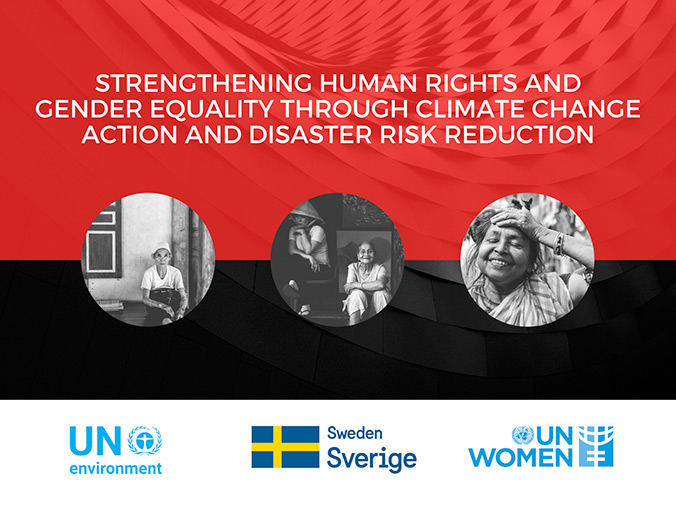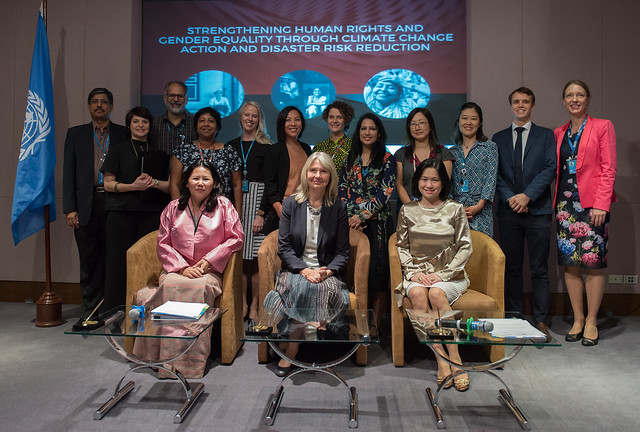Sweden joins forces with UN Environment and UN Women to build a climate resilient Asia-Pacific
Date:

Bangkok, Thailand — The Asia-Pacific region is making significant strides towards climate change action and disaster risk reduction. But long-lasting climate resilience in the region cannot be achieved without addressing the root causes of vulnerability and gender inequality, which disproportionality impacts women and girls and other marginalized populations in this region.
Women and girls in Asia-Pacific constitute 80 per cent of all those living under USD2 per day and face barriers to access natural resources, finance, energy, technologies, and health care, education, housing and property. Addressing these issues and using untapped potential of women and the disadvantaged groups in the climate change decisions and actions are part of the solution.
On the occasion of International Women's Day, the Government of Sweden is joining forces with UN Women and UN Environment to ensure fulfilment of human rights and gender equality in climate change and disasters risk reduction efforts in line with the Paris Agreement, Sendai Framework and the Sustainable Development Goals. To achieve these ambitious goals, increased technical capacity will be necessary for national governments, CSOs, regional institutions and other stakeholders to meet these commitments and achieve sustainable development.
Outlining the importance of investing in gender equality for climate resilience, "We are very pleased with this new partnership with UN Women and UN Environment, focusing on gender equality and climate change. Cooperation is crucial to address the challenges the Asia-Pacific region faces today and this innovative collaboration between two UN organisations with different thematic mandates is a good step in that direction. The project fits well with Sweden's priorities in Asia and the Pacific: to contribute to sustainable development by working regionally, through mutual interaction between human rights, democracy, gender equality, environment and climate change. In this way, we are convinced that this partnership will strengthen resilience in the region, said Anne-Charlotte Malm, Head of Regional Development Cooperation at the Embassy of Sweden, Bangkok.
Inclusive Climate Action
A large proportion of rural women in Asia and the Pacific derive their livelihoods from climate-sensitive sectors such as agriculture, fisheries and natural resources, thereby increasing their sensitivity to climate change impacts. In addition, women are more at risk also because of the discriminatory gender norms and power imbalances.
"UN Women is excited that through this project we are addressing crucial issues of gender equality and human rights in the context of resilience to climate change and disaster- in five years time, UN Women, together with its partners, hopes to see women and disadvantaged groups not only more resilient but also empowered to take decisions and lead actions on climate change and disasters," said Ms. Miwa Kato, Regional Director for UN Women in Asia and the Pacific.
Enabling women to be a part of climate change and disaster risk reduction actions and become renewable energy entrepreneurs means giving them a key to unlocking a brighter, more climate resilient future. This is true not just for women alone, but also for building resilient communities. Having access to clean energy has a multiplier effect that spills over into livelihoods, health, education and even safety and security of women.
"UN Environment welcomes this unique partnership with UN Women that will support women and marginalized groups to participate in climate change action and providing means to access renewable energy that can transform lives," said Dechen Tsering, Regional Director for UN Environment in Asia-Pacific.
For decades, women have been leading the Asia Pacific region on the path to sustainable growth and inclusive development. The time is now to invest in addressing vulnerabilities facing women and other marginalized groups and capitalizing on women's leadership and decision making to address climate change and mobilize the present and future generations for a stronger, greener and more resilient planet.
For more information:
Maria GuimaraesStrategic Partnerships Specialist
UN Women
Email: maria.guimaraes@unwomen.org
